Deuter is a century-old German brand that stands out not only for the quality of its high-end backpacks and sleeping bags but also for its commitment to sustainable and ethical practices. By adopting a comprehensive approach to sustainability, the brand demonstrates not only its commitment to the environment and social responsibility but also sets a standard for other companies in the outdoor market.
Check out 7 deuter initiatives for reducing environmental and social impact
1. Bluesign Standard
Sustainability in textile production is a matter that affects all of us. After all, it involves what we wear on our bodies every day. Whether it’s a functional jacket or a backpack for hiking, cycling, or skiing, the manufacturing process is complex and can have a significant impact on people and nature.
In its efforts to combat the overexploitation of people and nature during manufacturing, deuter adopted the Bluesign system in 2008, the most rigorous standard in the world for environmental protection, occupational safety, and consumer care in the textile industry. It serves as a guide for the entire production chain, evaluating the quantity, type, and quality of raw materials used, as well as energy and water consumption, chemical handling, noise pollution, waste generated, and workplace safety.
According to Bluesign, more than 1,000 chemical substances are used in the process to add color or waterproof performance, for example. Of these, more than 900 are harmful substances that must be carefully managed. Bluesign engineers and chemists have also listed over 800 banned chemical substances. This list is updated annually and is publicly accessible. The Bluesign standard also helps reduce the amount of resources used in textile manufacturing. According to Bluesign’s own statistics, their system results in a 50% reduction in water consumption, up to 30% in energy, and 15% in chemical usage.
“That’s exactly what deuter looks for in the materials it uses: performance and durability with minimal impact on the natural world. The company adheres to the strict standards of the Bluesign system out of responsibility to people, the environment, and our limited resources. This is a responsibility everyone should share,” explains Steffen Riese, Head of Material Management at deuter.
Unlike most eco-labels, the Bluesign system is concerned with examining the manufacturing processes of all individual components throughout the supply chain, and it subjects the fabrics used in deuter backpacks and sleeping bags to rigorous compliance tests.
If you’re passionate about outdoor activities and prioritize sustainably manufactured gear, by purchasing Bluesign products, you can be sure that:
- Harmful substances are restricted throughout the entire supply chain.
- They are not made with environmentally damaging substances.
- Controls and limits were respected for the use of chemicals.
- They are not harmful to human health.
2. Responsible Down Standard (RDS) certified down
All deuter down sleeping bags, in addition to meeting the requirements of the Bluesign standard and being treated with a PFC-free water-repellent finish, have complied with the Responsible Down Standard (RDS) since 2015.
The RDS monitors and ensures that the down and feathers come from animals that have not suffered unnecessarily. In addition to the ban on live-plucking and force-feeding, the certification includes other animal welfare provisions, such as sufficient food and water, no excessive competition with other animals, and the absence of growth hormones and genetically modified feed. Clear rules on hygiene and housing space, as well as sufficient outdoor access, are also imposed.
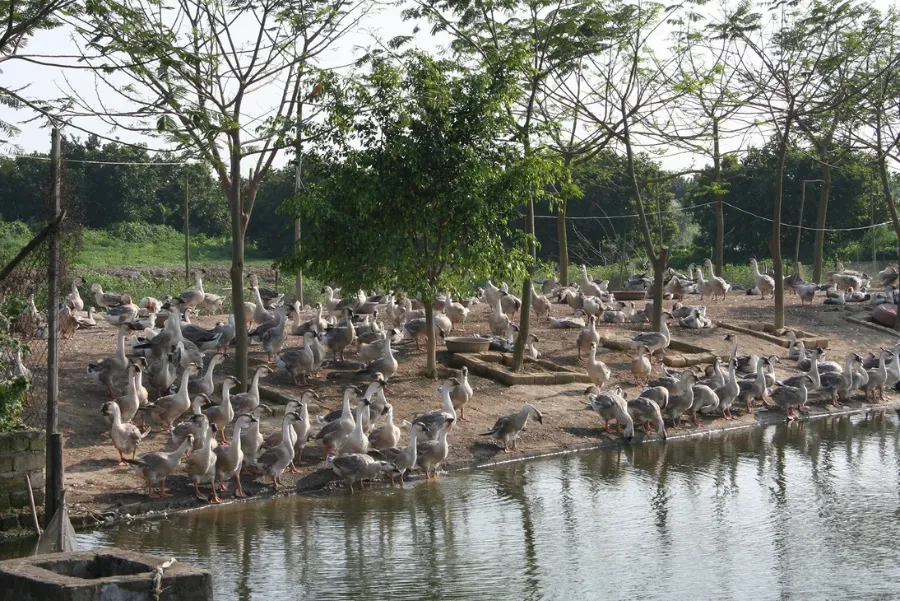
“Only if animal welfare is respected at all stages will the sleeping bag meet the RDS certification specifications. That’s why deuter works only with certified suppliers, who in turn use only certified down. You can recognize them by the Responsible Down Standard logo,” explains Philipp Burger, Product Manager Sleeping Systems at deuter.
deuter products containing certified down are identified by the “Certified Animal Welfare” logo.
3. A greener future WITHOUT PFAs
In the outdoor segment, the use of PFAS— a group of chemical substances used in industry and consumer goods for their water, dirt, and grease repellent properties—is common in treating surfaces and waterproofing textiles, tents, footwear, and for producing breathable membranes.
As these are highly harmful substances to the environment, humans, and animals, since 2019, deuter has manufactured all its products without the use of PFAS. However, achieving this goal was not easy, as there was no comparable alternative to the harmful chemicals for a long time. It was only with the launch of Greenpeace’s “Detox My Fashion” campaign in 2012 that suppliers and the chemical industry began developing eco-friendly methods for waterproofing textiles.
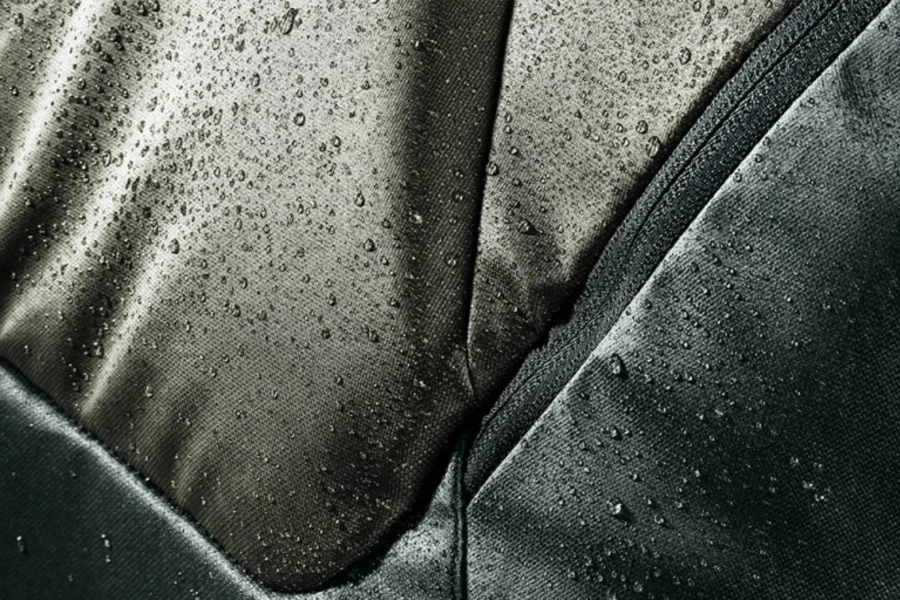
Today, deuter uses a DWR (Durable Water Repellent) that ensures water does not accumulate on the fabric surface, keeping the product dry. This method marked an ecological breakthrough for the company in waterproofing, resulting in products that are entirely PFAS-free.
4. Better to repair than to discard
Long-term durability is extremely important for deuter products. “We want consumers to enjoy their favorite gear for as long as possible. By extending the life cycle of our products, we also help conserve resources, as repairing is better than discarding. We’ve practiced this for over 125 years, and we have skilled specialists to carry out repairs in-house,” explains Natalie Birke, CSR Manager at deuter.
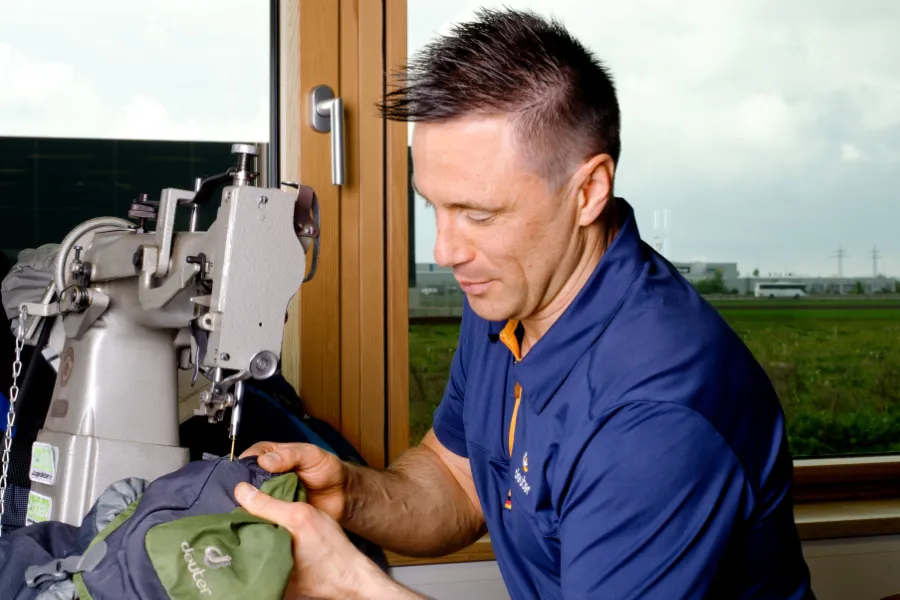
In Brazil, since 2001, the brand has offered a Technical Assistance service, repairing all products purchased in the country. This extends the lifespan of backpacks or sleeping bags as much as possible, helping to preserve natural resources and guaranteeing consumer investment for many years.
Additionally, deuter recently launched the deuter Brechó in Brazil—a way to keep products in use even after their original owners no longer need them.
However, it’s important to understand that much of the gear we use ends up needing repairs or replacement because preventative maintenance isn’t performed. At Gear Tips, we have various resources to help with that:
Gear Tips Plus lives and webinars
Gear Tips YouTube channel
- How to wash a trekking backpack (version 1)
- How to wash a trekking backpack (version 2)
- How to prevent bad odor in your backpack
- How to store your backpack
- Trekking repair kit
- Lava-tudo Azteq
5. Green Button Label
The well-being of nature and people is important to everyone. That’s why deuter aims to fulfill its own responsibility and manufacture its products in an environmentally and socially sustainable way. The company has already made significant progress on its path to greener processes and appropriate production conditions, but there’s always room for more—like adopting the “Grüner Knopf” certification in 2021, the first label monitored by the German government for sustainably produced textiles.
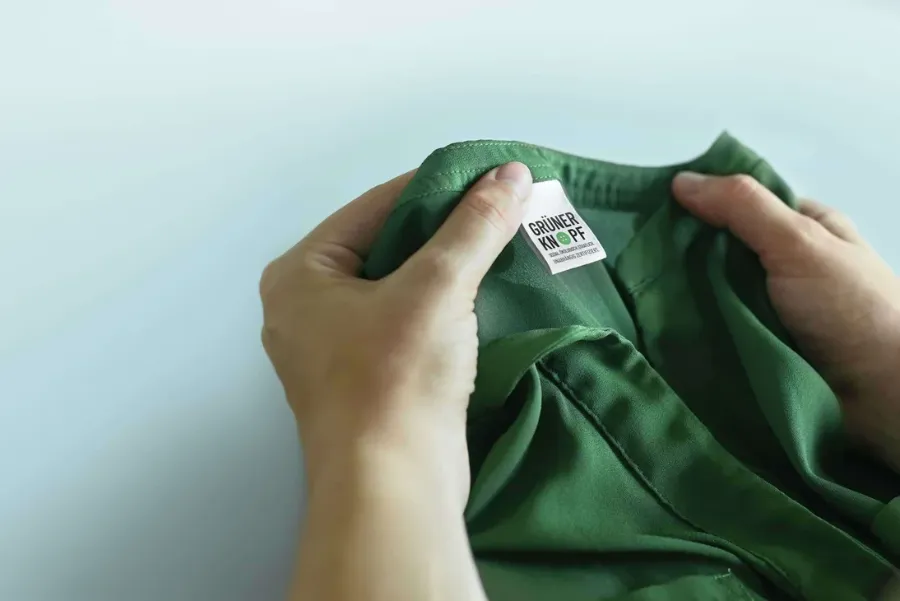
This certification represents a major milestone for textile sustainability, auditing both business practices and products. “To carry the label, products must be manufactured according to strict environmental and social standards advised by the government. The Green Button audits companies on due diligence, and products on how they’re made—regarding chemical use, environmental impact, and working conditions. That way, when consumers see the label, they can be confident they’re buying sustainable textiles,” explains Marco Hühn, Head of CSR / Quality / Repair Service at deuter.
Although the initiative was initially implemented mainly in Germany, it’s a global partnership based on European and international standards. Companies outside Germany can also apply for certification, which must meet or exceed 46 social and environmental standards, including minimum wage payments, adherence to defined working hours and overtime pay, prohibition of forced and child labor, restrictions on hazardous chemicals, and pollution limits for wastewater generated during the manufacturing process.
“We joined the Green Button because we believe it’s ‘good for people and good for the environment’. The goal is to protect people and the environment along the entire supply chain—from resource extraction to the finished backpack or sleeping bag,” concludes Marco.
6. Fair production for all
deuter does not engage in supplier switching, having focused for decades on two manufacturing partners and limiting the number of subcontractors. Regular audits are conducted with these suppliers to ensure standards are being maintained.
“deuter also fosters social bonds in its daily business, treating its partners with respect and appreciation. In collaboration with the Fair Wear Foundation, the company strives to ensure fair and socially responsible working conditions for all. This is a commitment we all share,” explains Marco Hühn, Head of CSR / Quality / Repair Service at deuter.
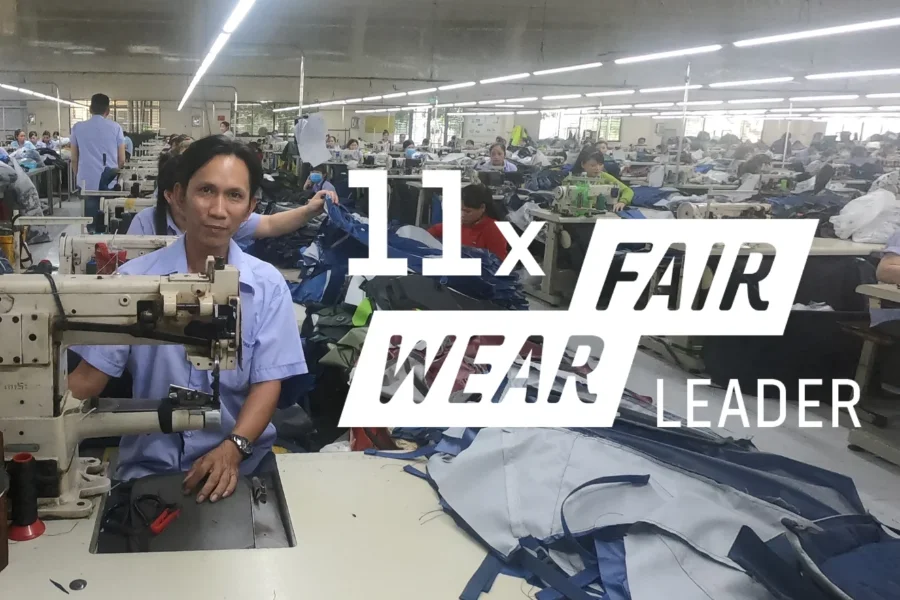
As a member of the FWF, deuter documents all its corporate social responsibility activities annually so the Fair Wear Foundation can evaluate and provide suggestions for improvement. “Our dedication to fair working conditions at supplier production sites has been recognized by the Foundation since we joined in 2011. In 2013 and every year since, deuter has been awarded the prestigious Leader status. In 2015, we also received the Best Practice Award for responsible purchasing,” adds Anna Steffen, CSR & Quality Manager.
“To create change across the industry, we need everyone on board.”
deuter and over 130 brands from ten European countries are united within the Fair Wear Foundation, committed to upholding the Code of Labour Practices with the goal of creating fair business and production structures. The company believes that if well-known major manufacturers set a good example, production partners will have no choice but to act in a socially responsible manner.
“deuter’s involvement with the FWF is a key part of its Together We Care strategy for 360° Responsibility. It’s a multi-stakeholder initiative that brings together companies and factories to improve working conditions in textile and garment factories, especially in production countries. Implementation of good practices is regularly evaluated by deuter representatives and independent experts,” says Anna Steffen.
7. Partnership for Sustainable Textiles
The deuter also works collaboratively with other members to share knowledge, strategies, and ideas through the Textile Alliance, which includes 86 companies and 14 trade associations. Alongside deuter are companies like Adidas, Aldi, H&M, and 20 NGOs such as WWF, trade unions, and representatives of the German government.
The goal is to improve social and environmental conditions in textile production worldwide. All measures are designed for member organizations are held accountable for taking action. The Textile Alliance is an effective way to prevent apathy. It requires members to analyze their production conditions openly and honestly.
The alliance focuses on 11 areas:
- Freedom of association and collective wage bargaining
- Discrimination, sexual harassment, and gender-based violence
- Health and safety
- Wages and social benefits
- Working hours
- Child labor and forced labor
- Anti-corruption
- Wastewater and chemical usage
- Environmental protection and resource use
- Greenhouse gas emissions
- Animal welfare (including sheep farming)
And you, are you committed to the environment? Do your choices reflect that awareness?
Choosing products from companies that practice sustainability is an act of individual responsibility that can make a significant impact on the environment and society. By selecting brands like deuter, among others, you support initiatives that promote social justice, environmental conservation, and sustainable development.
At Gear Tips, we’ve launched deuter collections several times, and we always highlight how important sustainability is to the brand. Watch below the launch of the deuter 2023 Collection, where we provide an overview of what the brand is doing:
“We play a key role in informing and raising awareness among consumers about the importance of making responsible choices. Through detailed reviews, guidance, and recommendations, we help you better understand the impact of your choices and opt for products aligned with sustainable practices,” says Pedro Lacaz Amaral, founder of Gear Tips.
Responsibility for a greener and fairer future starts with each of us—through the choices we make and the brands we support.
This post is also available in: Português (Portuguese (Brazil)) Español (Spanish)
